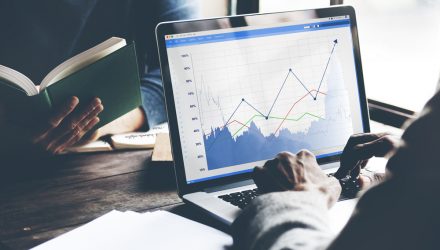With its hefty allocations to communication services and technology stocks, the Nasdaq-100 Index (NDX) is a favored destination for many growth investors.
The cap-weighted version of that index allocates over two-thirds of its weight to tech and communication services stocks and is top-heavy with its top five holdings combining for about 38% of its weight.
Investors can mitigate some of that concentration risk with equal-weight exchange-traded funds, such as the Direxion NASDAQ-100 Equal Weighted Index Shares (NYSEArca: QQQE) and the First Trust NASDAQ-100 Equal Weighted Index Fund (NasdaqGS: QQEW). QQQE and QQEW follow the Nasdaq-100 Index Equal Weight Index (NXDE).
“An equal-weighted index is a stock market index – comprised of a group of publicly traded companies – that invests an equal amount of money in the stock of each company that makes up the index. Thus, the performance of each company’s stock carries equal importance in determining the total value of the index,” according to the Corporate Finance Institute (CFI).
Value Play on Growth
Due to its long-running status as a growth haven, the Nasdaq-100 isn’t often thought of a value destination, but by introducing, equal weighting, investors can add a dash of the value factor to the equation.
“It’s been said by some market analysts that equally weighted indices are based on value and market capitalization weighted indices are driven by momentum,” notes CFI. “An index with equal weight in all companies must buy and sell as shares of companies increase and decrease in value, restoring the balance by buying more shares of a company with a declining share price and selling off shares when a company sees its share price rise.”
QQQE and QQEW offer the added benefit of reducing single stock risk – something to consider at a time when some market observers are concerned about lethargy in the famous FAANG quintet.
Equal weighting “means that there is less of an implicit bet on mega-cap firms in general. Instead of a weighted-average market cap of $755bn, NDXE’s average market cap of $128bn reflects an 83% reduction in the index’s typical constituent size,” according to Nasdaq Global Indexes. “Practically speaking, it means that if Microsoft, Amazon, or Apple (currently weighted more than 10% each in NDX) were to experience a particularly bad day or month or year (down 20%, for example), the impact of a loss is muted by more than 90%, reducing total portfolio drag.”
For more news, information, and strategy, visit the Nasdaq Portfolio Solutions Channel.
The opinions and forecasts expressed herein are solely those of Tom Lydon, and may not actually come to pass. Information on this site should not be used or construed as an offer to sell, a solicitation of an offer to buy, or a recommendation for any product.

